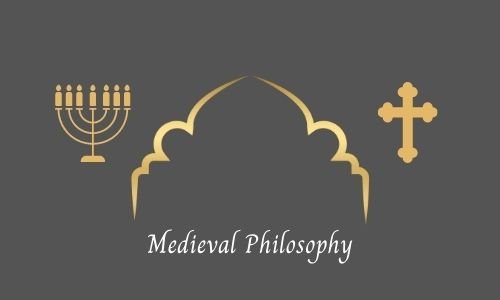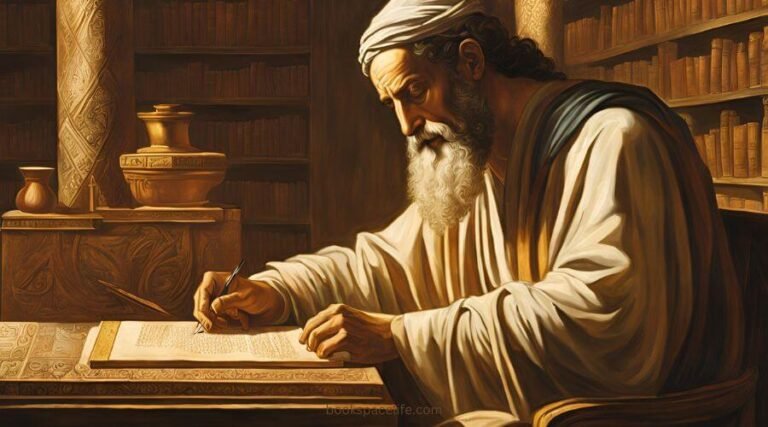Philo of Alexandria
Abraham Ibn Ezra: Poet, Philosopher, and Biblical Commentator
Abraham Ibn Ezra (1089–1164 CE) was a Spanish-Jewish poet, philosopher, astronomer, and one of the most celebrated biblical commentators in medieval Jewish history.
Known for his intellectual curiosity and deep commitment to understanding the world, Ibn Ezra’s works cover a range of fields from biblical exegesis and grammar to philosophy, astronomy, and mathematics.
His philosophical and theological insights, particularly his approach to interpreting scripture, helped shape Jewish scholarship and remain influential to this day.
This blog explores the fascinating life of Ibn Ezra, his intellectual journey, key contributions, and lasting legacy.
Table of Contents
(1) Early Life and Background
Abraham Ibn Ezra was born in Tudela, a town in the region of Navarre in northern Spain, around 1089. This period, known as the Golden Age of Jewish culture in Spain, was marked by significant achievements in literature, science, philosophy, and the arts within the Jewish communities of Al-Andalus (Muslim Spain).
Growing up, Ibn Ezra was immersed in an environment that valued intellectual pursuits, scientific inquiry, and poetry, and he had access to Jewish, Arabic, and Christian scholarship.
Though much of his early life remains unknown, it is believed that Ibn Ezra studied under some of the finest scholars in Spain and showed an early aptitude for languages, mathematics, and philosophical inquiry.
He was likely a close friend of the famous Jewish poet and philosopher Judah Halevi, and his work reflects a deep knowledge of the intellectual and religious debates of his time.
(2) Travels and Pursuit of Knowledge
In the early 1140s, Ibn Ezra left Spain, possibly due to the political and religious turmoil caused by the invasion of the Almohads, a North African Muslim dynasty known for its strict interpretations of Islam and its persecution of non-Muslims.
Leaving Spain marked the beginning of Ibn Ezra’s extensive travels, and he spent the next two decades wandering through Europe, eventually making his way to Italy, France, and possibly England.
During these travels, he not only encountered a diversity of intellectual and cultural influences but also wrote extensively on philosophy, grammar, and biblical exegesis.
His time in Italy and France, where he engaged with both Jewish and Christian scholars, significantly broadened his intellectual horizons.
These experiences contributed to the depth and variety of his work, as he incorporated insights from a range of fields and perspectives into his own thought.
(3) Major Philosophical and Scholarly Contributions
Ibn Ezra’s contributions spanned a wide array of fields, from biblical commentary to astrology and grammar.
However, his work is united by an overarching commitment to rational inquiry, linguistic precision, and intellectual integrity.
Some of his most influential contributions include his biblical exegesis, his exploration of philosophy and astrology, and his works on Hebrew grammar.
1. Biblical Commentary
Abraham Ibn Ezra is best known for his biblical commentaries, particularly his work on the Torah (the first five books of the Bible). His approach to scripture was unique for its time, as he emphasized a rational and linguistic analysis of the text.
Ibn Ezra sought to understand the Torah by examining the Hebrew language, historical context, and literary style. He advocated for a peshat, or straightforward, interpretation of the text, avoiding mystical or allegorical readings.
Ibn Ezra’s commentaries often emphasize the importance of understanding the grammatical structure of Hebrew, as he believed that correct linguistic analysis was essential to understanding the true meaning of the biblical text.
For example, he interpreted difficult or ambiguous passages by examining verb forms, syntax, and the historical usage of words, thereby setting a standard for rigorous linguistic analysis in biblical exegesis.
One of his most controversial contributions was his suggestion that certain portions of the Torah might have been written after Moses’ time, a position that foreshadowed later biblical criticism.
Although he was cautious in these interpretations, his willingness to question traditional assumptions about authorship had a lasting impact on Jewish scholarship and opened the door for future critical examination of the Bible.
2. Philosophy and Astrology
In addition to his work on the Bible, Ibn Ezra was deeply interested in philosophy, astrology, and astronomy, reflecting the scientific interests of his time.
He wrote extensively on astrology, a field that, in the Middle Ages, was regarded as both a science and a way to understand divine influence on the natural world.
Ibn Ezra believed that astrology could offer insights into human behavior, natural phenomena, and even certain theological questions.
While modern readers may view astrology with skepticism, for Ibn Ezra and his contemporaries, it was an intellectually respectable field grounded in the study of the heavens.
His writings on astrology reveal his belief in a universe governed by natural laws, with God’s influence working through celestial bodies.
His philosophical perspective combined a rational view of the cosmos with a religious understanding, as he saw the study of nature and astronomy as a way to appreciate the wisdom of the Creator.
In philosophy, Ibn Ezra was influenced by the works of earlier Jewish philosophers like Saadia Gaon, as well as Islamic and Greek thought, particularly the works of Aristotle.
However, he maintained a cautious approach to speculative philosophy, advocating that philosophical inquiry should not contradict the principles of Judaism.
For him, reason and revelation were both valid paths to knowledge, but they must ultimately be reconciled in service to faith.
3. Hebrew Grammar and Language
Ibn Ezra was a master of Hebrew grammar and wrote extensively on the linguistic aspects of the Hebrew Bible.
He emphasized the need to understand Hebrew grammar and syntax for accurate biblical interpretation, an approach that laid the groundwork for later linguistic studies within Jewish scholarship.
His grammatical works often include detailed analyses of verb forms, noun cases, and sentence structure, making them valuable resources for later grammarians and biblical scholars.
His focus on grammar was revolutionary because it represented a shift from purely theological to linguistic considerations in understanding scripture.
For Ibn Ezra, the Hebrew language was not only a medium for divine revelation but also a complex, structured system worthy of rigorous study.
His emphasis on language and grammar set a standard for future Jewish scholars and helped promote the study of Hebrew as a scientific discipline within Jewish education.
(4) Influence and Legacy
The impact of Abraham Ibn Ezra’s work is felt across several disciplines within Jewish scholarship.
His approach to biblical commentary, in particular, left a profound mark on both Jewish and Christian thinkers, and his commentaries became essential texts for scholars seeking a rational approach to scripture.
His influence extended well beyond his lifetime, inspiring generations of Jewish philosophers, exegetes, and scientists.
‘(i) Influence on Biblical Exegesis
Ibn Ezra’s commitment to a rational, peshat-based approach to scripture set a precedent in Jewish exegesis, influencing figures like Nachmanides (Ramban) and later scholars of the Enlightenment period.
His works became essential reading for Jewish students and commentators and were widely studied in medieval Jewish academies.
Christian scholars in Europe also studied his commentaries, as they appreciated his linguistic insights and rational approach to the Old Testament, especially during the Renaissance and Reformation periods when Hebrew studies were increasingly valued.
(ii) Legacy in Hebrew Grammar and Linguistics
Ibn Ezra’s contributions to Hebrew grammar and language studies established a foundation for later Jewish grammarians.
His detailed analyses of Hebrew syntax and vocabulary were incorporated into the curriculum of Jewish study, and his influence can be seen in the work of later linguists who sought to preserve and systematize the Hebrew language.
His writings became a bridge between the medieval study of Hebrew and the revival of Hebrew as a modern, spoken language, as his grammar principles remained relevant for centuries.
(ii) Impact on Jewish Philosophy and Rational Inquiry
By integrating scientific inquiry, philosophy, and theology, Ibn Ezra embodied a Jewish intellectual tradition that valued reason as an essential complement to faith.
His view that knowledge of the natural world could enhance one’s understanding of God influenced later Jewish philosophers, including Maimonides, who shared Ibn Ezra’s respect for science and rational thought.
Though he was not as speculative as some later philosophers, his cautious, rational approach to questions of faith and science helped legitimize the pursuit of secular knowledge within a religious framework.
(5) Conclusion
Abraham Ibn Ezra’s life and works are a testament to the intellectual vitality of Jewish thought during the medieval period.
His contributions to biblical commentary, philosophy, astrology, and grammar reflect a scholar who was unafraid to ask questions, explore new ideas, and push the boundaries of traditional interpretations.
Through his travels and writings, he left an enduring legacy that shaped not only Jewish scholarship but also influenced Christian and Islamic intellectual traditions.
Ibn Ezra’s insistence on linguistic precision, rational inquiry, and an ethical approach to philosophy has continued to resonate with scholars and students alike.
His belief that Judaism could be both intellectually rigorous and spiritually meaningful remains a guiding principle in contemporary Jewish thought. As a bridge between tradition and innovation, Abraham Ibn Ezra’s work reminds us of the importance of balancing faith with reason, and it inspires those who seek a deeper understanding of both the divine and the natural world.








